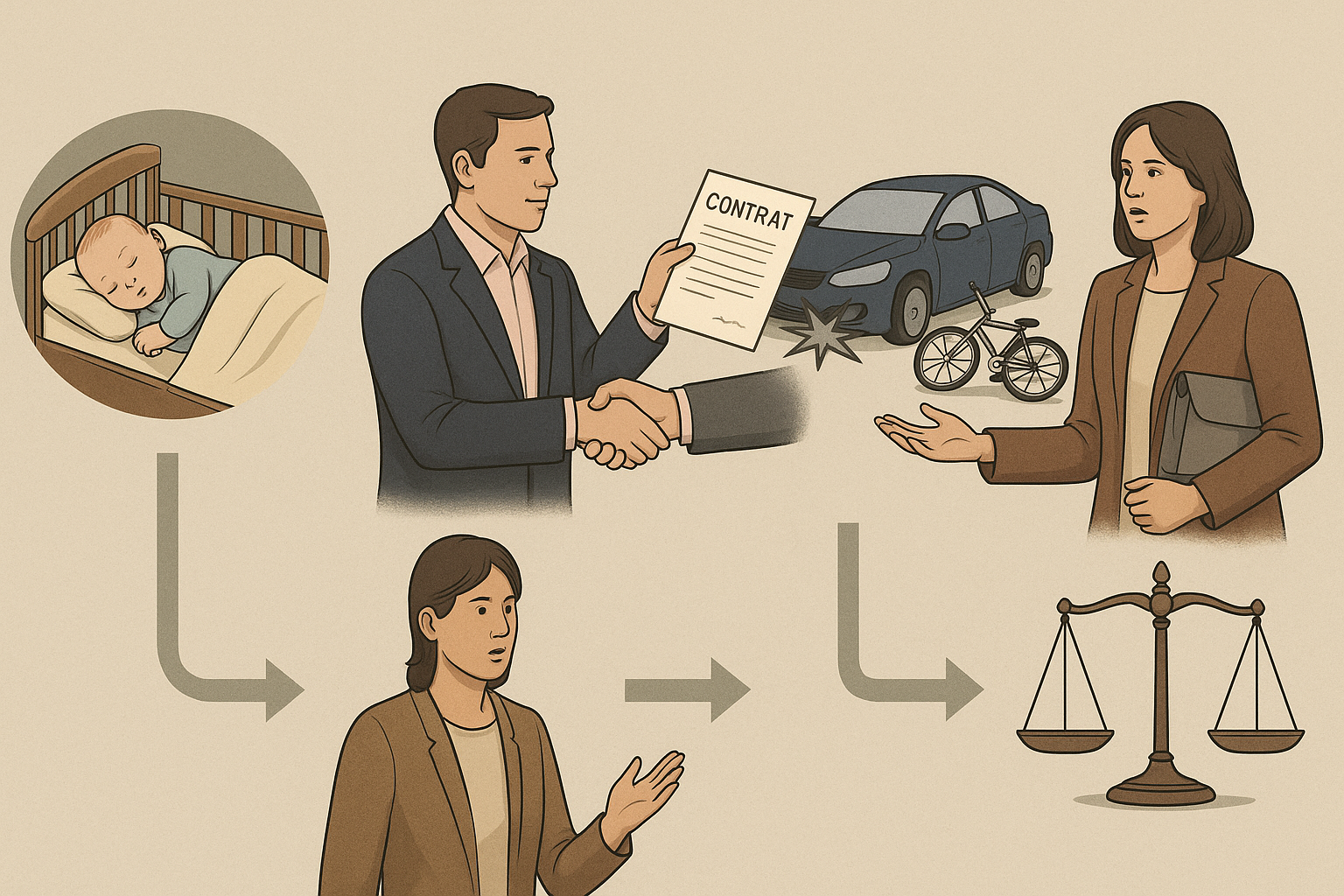Published on September 18, 2025
In Quebec civil law, a presumption is a legal mechanism that facilitates proof by taking for granted, until proven otherwise, that a person is responsible in a given situation. Some presumptions concern fault, others concern liability. They apply, for example, to the parents of a minor, property owners, or manufacturers of defective goods. Our firm can help you understand these rules, assess their impact on your situation, and effectively defend your rights.

Learn more
In Quebec civil law, civil liability is based on general rules, but also on several presumptions provided for by the Civil Code of Quebec (C.C.Q.). These presumptions are intended to make it easier for the victim to prove their case by assuming, until proven otherwise, that certain people are responsible for damage caused in specific circumstances.
Types of Presumptions
There are two types of presumptions:
Presumption of fault: it is presumed that the person has committed a fault. They must overturn this presumption by proving that they acted correctly.
Presumption of liability: this goes further. In this case, the absence of fault is not enough. The means of exoneration are limited, and the person must invoke, for example, force majeure or the victim’s fault.
The C.C.Q. provides for several specific situations where these presumptions apply.
The main presumptions under the C.C.Q.
1. The parent and their minor child (art. 1459 C.C.Q.)
The parent is bound to repair the injury caused by the act or fault of their minor child under their authority. In practice, this generally refers to parents, since separation or divorce does not end parental authority.
The actual author of the damage remains the minor child, but the parent is presumed responsible. However, they may be exonerated by proving that they committed no fault in the custody, supervision, or education of the child. Force majeure or the fault of the victim may also be invoked.
2.The guardian and the minor (art. 1460 C.C.Q.)
Anyone who, without having parental authority, assumes the custody, supervision, or education of a minor is bound in the same way as the parent. This may include, for example, a teacher or daycare.
However, a volunteer guardian is not covered by this presumption. Note also that parental liability and guardian liability may coexist in the same situation.
3.The tutor of an adult lacking reason (art. 1461 C.C.Q.)
Unlike minors, there is no automatic presumption of liability for the guardian of an adult lacking reason. Since 1989, the legislator has removed this presumption and granted immunity to the guardian. Therefore, they are liable only if they have committed intentional or gross fault.
4. The employer and their employee (art. 1463 C.C.Q.)
The employer is presumed liable for the injury caused by their employee in the performance of their duties. For this presumption to apply, the following must exist :
- A fault committed by the employee,
- A relationship of subordination between employer and employee,
- The fault committed in the course of duties,
- Damage caused.
5.The custodian of property (art. 1465 C.C.Q.)
The custodian of property is liable for injury caused by the autonomous act of that property. For example, when a washing machine explodes and injures someone.
However, they may be exonerated by invoking force majeure, the fault of the victim, or by proving that they themselves committed no fault.
6. The custodian of an animal (art. 1466 C.C.Q.)
The owner of an animal, or its custodian, is liable for injury caused by it. This applies even if the animal is entrusted to a third party or used by another person.
This presumption generally applies to domestic animals. The person responsible may invoke force majeure (except if the animal was lost or escaped) as well as the fault of the victim.
7. The owner of a building in ruin (art. 1467 C.C.Q.)
The owner of a building is bound to repair injury caused by the total or partial collapse of the building, whether resulting from lack of maintenance or a construction defect.
The victim must demonstrate the existence of such a defect in order to benefit from the presumption.
8. The manufacturer, distributor, or supplier of a defective movable (arts. 1468, 1469, and 1473 C.C.Q.)
Liability here is extended to the manufacturer, distributor, and supplier of a product, even if they no longer had control over it at the time of the damage. The victim must prove the existence of a safety defect in the product.
Several means of exoneration are provided, including :
- Force majeure,
- Proof that the victim knew or could have known of the defect,
- Proof that the defect was unknowable at the time of marketing, given the state of scientific and technical knowledge, provided no negligence occurred in the duty to inform.
Conclusion
Presumptions of liability under the Civil Code of Quebec are essential tools for restoring balance between the victim and the potential author of damage. They ease the victim’s burden of proof, while imposing on presumed liable persons heightened vigilance in the exercise of their functions, custody of others, or maintenance of their property.
Although theoretically rebuttable, some presumptions remain more difficult to overturn, as they reflect the legislator’s intent to protect the victim. Understanding the scope of each presumption is therefore fundamental, both to prevent potential liability and to assert one’s rights in court.
If you are involved in a dispute related to a presumption of liability, it is essential to obtain appropriate legal advice. Our team can assist you in analyzing your situation and implementing the necessary remedies. To learn more, visit our page dedicated to disputes and discover how we can help defend your interests.